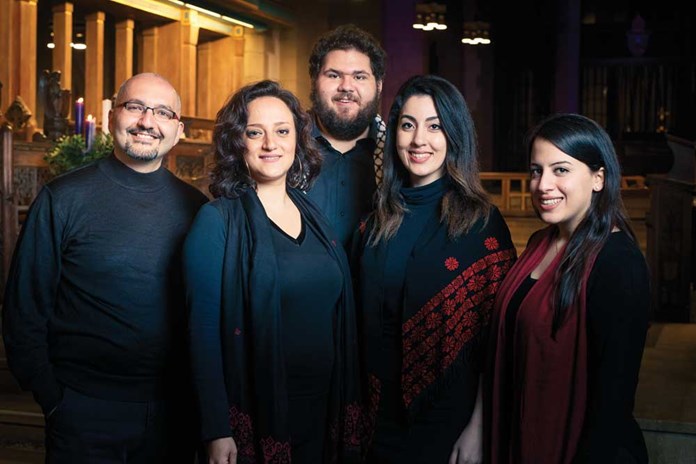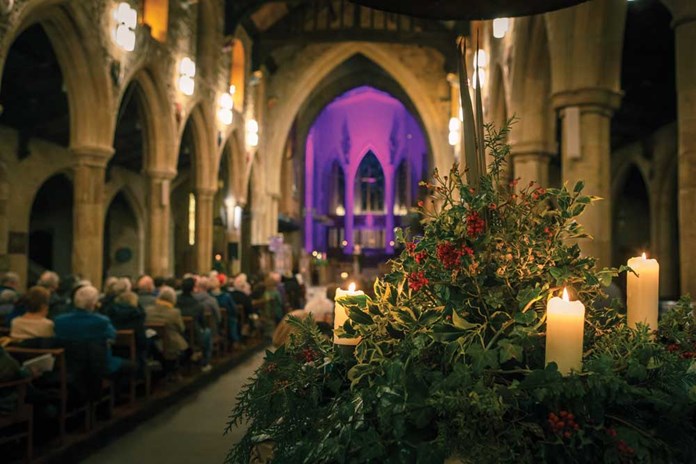Wi’am — a bridge to dialogue
“When we go up onto the roof of the centre and look from there, we see the Unholy Trinity, the panoramic history of Palestine from 1948. We see the refugee camp, we see the settlements and we see the Wall.” Gill Hewitt sat down with Wi’am founder Zoughbi Zoughbi.
Tell us about founding Wi’am, the Palestinian Confliction Transformation Centre in 1995 and how the centre has developed over the years to where it is now. Have the methods you use and the challenges you face changed since then?
The foundation of Wi’am came after long experience in the fields of conflict transformation, of building civil society and wanting to create a better atmosphere for our people. In 1995, the focus was on mediation among our people as there were many problems and conflicts as a result of the social, political and community situation in that period.
We needed a centre like Wi’am to give hope for people and to help find an amicable solution to problems based on win/win. This work continues and unfortunately grows, as the occupation puts intense pressure on Palestinian society at every level.
Of course, we also continue to work with youth, women, children, advocacy and citizen diplomacy. We network with local and international organisations and focus on enhancing the common living of people from all faiths. When we go up onto the roof of the centre and look from there, we see the Unholy Trinity, the panoramic history of Palestine from 1948. We see the refugee camp, we see the settlements and we see the Wall.
The foundation of Wi’am came after long experience in the fields of conflict transformation, of building civil society and wanting to create a better atmosphere for our people.
At Wi’am we have agreed that we will not fold our hands and let their victim mentality control us and we also say, ok, this is our situation, but here is our creative resistance. We respond to the Unholy Trinity that we can see with three things of our own. First, the presence of Wi’am in this place, second the garden with its beauty in the face of this ugly concrete and third the playground for the kids in the shadow of the Wall.
It’s inspiring that your location is an integral part of your resistance. However, you are situated in a very vulnerable place with frequent incursions from the Israeli soldiers. Does this affect what you do?
Of course. First of all, we are blessed to be in Bethlehem, even next to the apartheid wall, because it reminds us of the suffering of the people all over the world. As Martin Luther King said, “injustice anywhere is an infringement on justice everywhere”, and it is good to be sharing feelings with others who are oppressed as an underdog.

Sublime: It was the Choir of Bethlehem’s first visit to the UK. They were so well received everywhere we went and were such fun.
We are very vulnerable because any activity or protest in Bethlehem will be next to the wall and when there’s an activity for kids or youth the Israeli army shower us with tear gas, rubber bullets, some live ammunition, and even skunk water. But we are determined, we have the perseverance and the resilience to be there and we are not able to do it if we don’t have partners all over the world and especially people who are with us, not only in the flesh when they come to visit, but also in the spirit even when we are not together. This empowerment keeps us going and keeps our hope and keeps our sanity.
As Martin Luther King said, “injustice anywhere is an infringement on justice everywhere”, and it is good to be sharing feelings with others who are oppressed as an underdog.
You were talking a little while ago about BDS — Boycott Divestment and Sanctions, and you said: “we support BDS not to bring Israel to its knees but to bring it to its senses.” Is that still your view?
Yes, I believe BDS is an important and legitimate form of non-violent struggle. When we talk about BDS we are talking about boycotting Israeli goods, especially from settlements, divesting from any company that prolongs occupation and imposing sanctions on Israel that bring it to its senses, not its knees.

A Perfect Setting: Bradford Cathedral was such a wonderful setting for one of our Bethlehem carol services.
Our struggle is for restorative justice, based on redressing the wrongs rather than avenging them. We don’t want punitive justice; we don’t want to create other victims. What we are reaching for is for the world to say that the Palestinians are entitled to live in dignity and integrity.
Yes, I believe BDS is an important and legitimate form of non-violent struggle.
BDS is one form of this kind of approach rather than to call for a Jihad or for war. At the same time, it is up to the Israeli occupation to respond to this non-violent Palestinian initiative because what we want is to deprive an Israeli government of an enemy.
Over many years Amos Trust has built a longlasting relationship with Wi’am. We have brought many people to visit and to learn. What is your message to us today and what inspires you and keeps hope alive?
I think it is people like you who are a renewable source of hope for us. You have the perseverance and resilience which is, for us, the hope itself incarnated in this partnership. Our message is that you are needed more than before. We need more of you, we need more groups to come, we need more advocacy before it is too late. It will be the voice of the voiceless through partnership and through creative forms of nonviolence that will end this struggle and bring justice and peace.
I think it is people like you who are a renewable source of hope for us. You have the perseverance and resilience which is, for us, the hope itself incarnated in this partnership.
We need you because the Israeli needs to be awakened and the world needs to be awakened, and to be awakened we need to assume collective responsibility. With your presence you are contextualizing collective responsibility, empowering the local community and empowering the Israeli peace activists.
You are our ambassadors for justice and peace. We are, in a way, a bridge to dialogue where cultures and nationalities can meet in order to say “wait a minute — this situation cannot go on — injustice will not last forever.”
— — — — — — —
Watch and share our short film about Wi’am’s work.
Read more about Wi'am.




